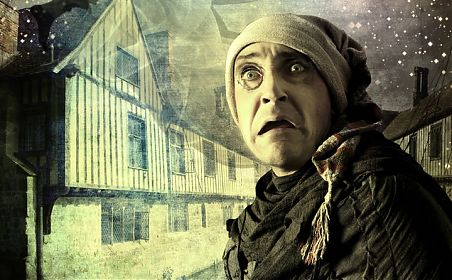God of Carnage
Friday February 6, 2009 in theatre |
Since the continuing closures and/or deliberate oddness of the Bristol Old Vic, my favourite nearby theatre has become the Theatre Royal at Bath. Last night I braved the elements to see God of Carnage by Yasmina Reza. The play first opened in 2006 and the original West End production starred Ralph Fiennes and Ken Stott. There was a hidden agenda for seeing the new Bath version as I knew one of the cast. Or I thought I did; my friend has mysteriously left the production so no luvvy visits to dressing rooms for me.
No matter. Yasmina Reza is best known for Art, which ran for years in London. God of Carnage, like Art, received the Christopher Hampton treatment in translating it from the original French. A play about the middle classes, the retained French names and references add a certain oddness, or something, to the play. But I won’t say jena se qua. There’s also a stark and nakedly intimate setting, all the more so if, like us, you have almost front row seats.
Richard E Grant and Serena Evans play one middle class couple who visit the house of another middle class couple, Roger Allam and Lia Williams. The Allam’s eleven year old son is recovering from an assault from the Grant’s eleven year old son; he’s has two teeth knocked out in a fight and the four gather in an attempt to make amends. It’s a frosty meeting; Allam and Grant both unlkeable in different ways. Both pompous and annoying, Grant especially so as he takes endless calls on his mobile phone. The women aren’t much better either, and the four hander reveals both couples to be depressed with their bleak and narrow lives.
In Harold Pinter’s hands, God of Carnage would have turned a simple idea into a work of genius. David Hare too would probably have a great deal of fun with this idea. At the opposite end of the spectrum, Mike Leigh achieved far greater results from four adults awkwardly thrown together in Abigail’s Party. Reza’s play, or perhaps Hampton’s handling of it, appears too stagey, and where Pinter always deliberately played with the artificiality of the stage I think this is beyond Reza’s/Hampton’s talent. There are a lot of good moments in God of Carnage, and many laughs, but not of the outstanding kind and I came away thinking the subject matter was all too lightly handled.
As I suspected from the opening, the adults in the play descend to far lower depths of hurt and loss of civility than either of their children. When a desperate bottle of rum is produced the subsequent drunkenness reveals their hidden despair even more. But, cynic that I am, I was hoping for them to have sunk much further than they did, and the play ends with some very slim chance of redemption. Nevertheless, I did find the closing scene the most effective. Worth a look, even if it does mean missing the luvvy stuff.
Footnote: can anyone answer this. Does Richard E.Grant really mean to break his chair when he sits down? He certainly handled the mishap very well, but I didn’t see how it added to proceedings.

